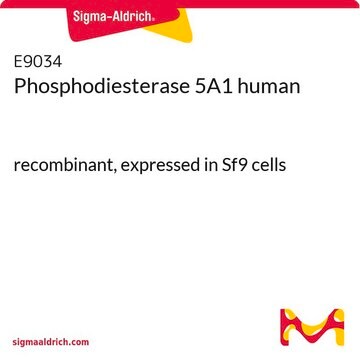G1642
sn-Glycerol-3-phosphocholine Phosphodiesterase from mold
lyophilized powder, ≥5 units/mg protein
Sinonimo/i:
Glycerophosphorylcholine phosphodiesterase from mold
Autenticatiper visualizzare i prezzi riservati alla tua organizzazione & contrattuali
About This Item
Numero CAS:
Numero MDL:
Codice UNSPSC:
12352204
NACRES:
NA.54
Prodotti consigliati
Forma fisica
lyophilized powder
Attività specifica
≥5 units/mg protein
Composizione
Protein, ~40% Bradford
Temperatura di conservazione
−20°C
Definizione di unità
One unit will produce 1.0 μmole of choline from L-α-glycerophosphorylcholine, G4007, per min at pH 8.0 at 37 °C.
Stato fisico
Lyophilized powder containing Tris buffer salt
Codice della classe di stoccaggio
11 - Combustible Solids
Classe di pericolosità dell'acqua (WGK)
WGK 3
Punto d’infiammabilità (°F)
Not applicable
Punto d’infiammabilità (°C)
Not applicable
Dispositivi di protezione individuale
Eyeshields, Gloves, type N95 (US)
Certificati d'analisi (COA)
Cerca il Certificati d'analisi (COA) digitando il numero di lotto/batch corrispondente. I numeri di lotto o di batch sono stampati sull'etichetta dei prodotti dopo la parola ‘Lotto’ o ‘Batch’.
Possiedi già questo prodotto?
I documenti relativi ai prodotti acquistati recentemente sono disponibili nell’Archivio dei documenti.
Carmelina D Anfuso et al.
Lipids, 38(1), 45-52 (2003-04-03)
In pericytes from bovine retina, the enzyme glycerophosphocholine phosphodiesterase, catalyzing the hydrolysis of sn-glycero-3-phosphocholine to glycero-3-phosphate and choline, has been characterized with respect to pH optimum, metal ion dependence, Km, inhibitors, and subcellular localization. In these cells, the natural substrate
C D Anfuso et al.
Comparative biochemistry and physiology. Part B, Biochemistry & molecular biology, 112(3), 493-501 (1995-11-01)
While steady-state kinetic parameters (metabolite pools, Km and activation energies) are partially known for the enzymes involved in phosphatidylcholine synthesis and degradation in mammalian brain, they are not available for the nervous system of lower vertebrates or invertebrates. Since the
Mária Simocková et al.
The Journal of biological chemistry, 283(25), 17107-17115 (2008-04-25)
The product of the open reading frame YPL206c, Pgc1p, of the yeast Saccharomyces cerevisiae displays homology to bacterial and mammalian glycerophosphodiester phosphodiesterases. Deletion of PGC1 causes an accumulation of the anionic phospholipid, phosphatidylglycerol (PG), especially under conditions of inositol limitation.
J Yuan et al.
Neurochemical research, 19(1), 43-48 (1994-01-01)
An enzyme releasing phosphocholine from glycerophosphocholine was purified to apparent homogeneity based upon SDS-PAGE. The enzyme was liberated from lyophilized bovine myelin by differential detergent extraction and final purification was accomplished with Q-Sepharose Fast Flow chromatography yielding an apparently homogeneous
J N Kanfer et al.
Neurochemical research, 18(3), 331-334 (1993-03-01)
Previous studies have demonstrated elevated brain levels of phosphomonoesters in early stages of Alzheimer's disease and elevations of phosphodiesters later in the disease. In addition, preliminary quantitative analyses of the phospholipids of Alzheimer's brain reveals either decreases in some phospholipids
Il team dei nostri ricercatori vanta grande esperienza in tutte le aree della ricerca quali Life Science, scienza dei materiali, sintesi chimica, cromatografia, discipline analitiche, ecc..
Contatta l'Assistenza Tecnica.








